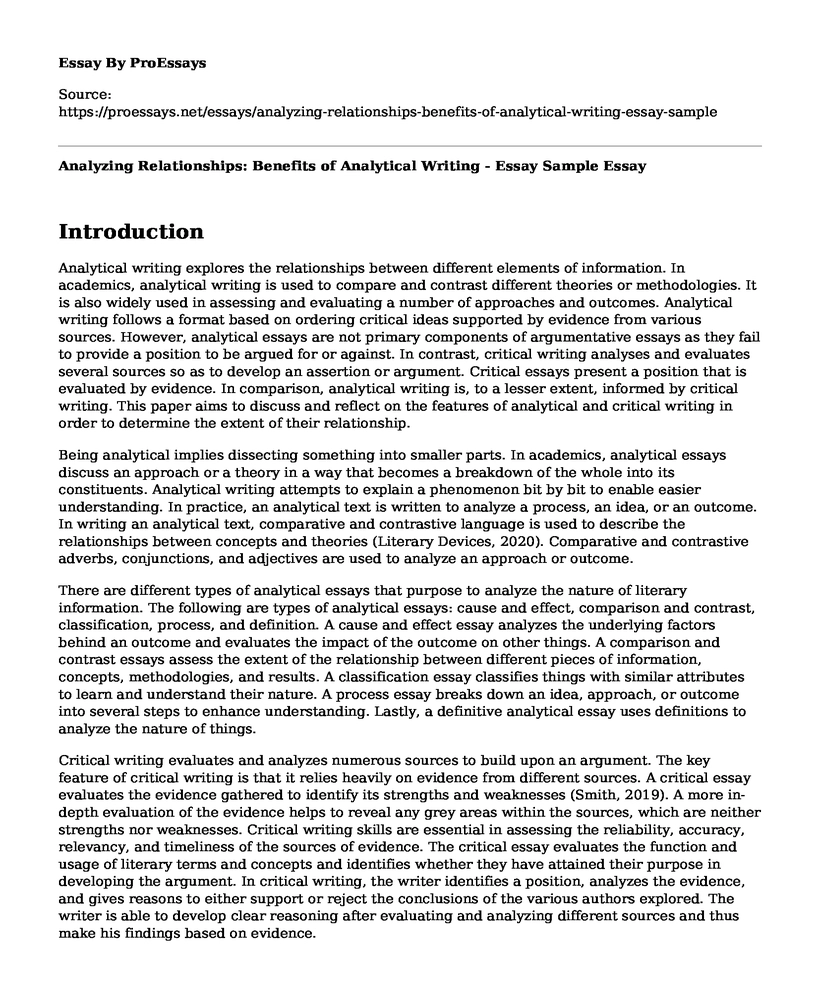Introduction
Analytical writing explores the relationships between different elements of information. In academics, analytical writing is used to compare and contrast different theories or methodologies. It is also widely used in assessing and evaluating a number of approaches and outcomes. Analytical writing follows a format based on ordering critical ideas supported by evidence from various sources. However, analytical essays are not primary components of argumentative essays as they fail to provide a position to be argued for or against. In contrast, critical writing analyses and evaluates several sources so as to develop an assertion or argument. Critical essays present a position that is evaluated by evidence. In comparison, analytical writing is, to a lesser extent, informed by critical writing. This paper aims to discuss and reflect on the features of analytical and critical writing in order to determine the extent of their relationship.
Being analytical implies dissecting something into smaller parts. In academics, analytical essays discuss an approach or a theory in a way that becomes a breakdown of the whole into its constituents. Analytical writing attempts to explain a phenomenon bit by bit to enable easier understanding. In practice, an analytical text is written to analyze a process, an idea, or an outcome. In writing an analytical text, comparative and contrastive language is used to describe the relationships between concepts and theories (Literary Devices, 2020). Comparative and contrastive adverbs, conjunctions, and adjectives are used to analyze an approach or outcome.
There are different types of analytical essays that purpose to analyze the nature of literary information. The following are types of analytical essays: cause and effect, comparison and contrast, classification, process, and definition. A cause and effect essay analyzes the underlying factors behind an outcome and evaluates the impact of the outcome on other things. A comparison and contrast essays assess the extent of the relationship between different pieces of information, concepts, methodologies, and results. A classification essay classifies things with similar attributes to learn and understand their nature. A process essay breaks down an idea, approach, or outcome into several steps to enhance understanding. Lastly, a definitive analytical essay uses definitions to analyze the nature of things.
Critical writing evaluates and analyzes numerous sources to build upon an argument. The key feature of critical writing is that it relies heavily on evidence from different sources. A critical essay evaluates the evidence gathered to identify its strengths and weaknesses (Smith, 2019). A more in-depth evaluation of the evidence helps to reveal any grey areas within the sources, which are neither strengths nor weaknesses. Critical writing skills are essential in assessing the reliability, accuracy, relevancy, and timeliness of the sources of evidence. The critical essay evaluates the function and usage of literary terms and concepts and identifies whether they have attained their purpose in developing the argument. In critical writing, the writer identifies a position, analyzes the evidence, and gives reasons to either support or reject the conclusions of the various authors explored. The writer is able to develop clear reasoning after evaluating and analyzing different sources and thus make his findings based on evidence.
Conclusion
In summary, analytical writing is less informed by critical writing. Whereas critical writing identifies and states a clear position, an analytical essay does not have an identifiable thesis. A critical article presents clear and concise identifiable evidence to support the argument. In analytical writing, the writer is merely concerned with evaluating the nature of evidence to identify its strengths and weaknesses. In comparison, it is clear that critical essay entails a more in-depth analysis of evidence, whereas analytical writing barely describes the nature of the information.
References
Literary Devices, (2020). Analytical Essay. Retrieved February 20, 2020, from https://literarydevices.net/4243-2/
Smith, S. (2019). Critical Writing. Retrieved February 20, 2020, from https://www.eapfoundation.com/writing/critical/
Cite this page
Analyzing Relationships: Benefits of Analytical Writing - Essay Sample. (2023, Apr 07). Retrieved from https://proessays.net/essays/analyzing-relationships-benefits-of-analytical-writing-essay-sample
If you are the original author of this essay and no longer wish to have it published on the ProEssays website, please click below to request its removal:
- Qualitative Data and Research Phenomena Essay
- Financial Statement Analysis Essay
- Essay Sample on Explanation on How Big Data Works in Digital Supply Chain
- Essay on Moral Obligations of Psychological Researchers: Safeguarding Human Participants
- SWOT Technique
- Paper Example on Capstone Research Techniques: Research Paper & Professional Products
- Australia's Information Privacy Laws - Research Paper Sample







